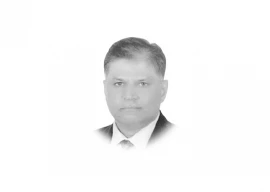
The Sindh High Court (SHC) on Thursday ordered the Sindh Environmental Protection Agency (Sepa) to consider any objections that may be filed by human rights activists or anyone else to the proposed construction of two nuclear power plants in Karachi.
A division bench, comprising justices Sajjad Ali Shah and Syed Saeed-ud-Din Nasir, issued this direction while disposing of an application seeking contempt proceedings against Sepa director Muhammad Naeem Mughal for allegedly violating the court’s order.
The plea was moved by a group of four petitioners — filmmaker Sharmeen Obaid Chinoy, physicists Dr Pervez Amirali Hoodbhoy and Dr Abdul Hameed Nayyar and architect Arif Belgaumi — who had earlier challenged the construction of the K2 and K3 nuclear power plants.
They recalled that while disposing of their earlier petition on December 22, 2014, the court had issued directives to ensure public participation in the process of reviewing the fresh environmental impact assessment (EIA) report of the project.
Their lawyer, Abdul Sattar Pirzada, argued that a bare perusal of the court order revealed the repeated emphasis placed on strict adherence to the Sepa Act and the Regulations 2014 for the EIA’s review, adding that public participation was to be guaranteed by Sepa.
Notwithstanding with the court’s order, he alleged that Mughal had issued a public notice on April 11, inviting objections from the public. He said that this ran directly contrary to Sections 17(3) and (6) of the Sepa Act as well as Section 11 of the 2014 Regulations and violated the SHC’s order.
Pirzada argued that contrary to the requirements, the public notice was not issued in an English or Urdu national newspaper but only in an English newspaper that could not be considered as a national newspaper due to its limited circulation. Hence, he claimed, the advertisement failed to achieve the objective of securing effective participation from the general public, falling short of the requirements envisaged under the Sepa Act. He added that the public notice was also published in a Sindhi language newspaper, which could also not be deemed as a national newspaper with general circulation in the area affected by the project.
The applicants further argued that public participation must be guaranteed during the review of the EIA report by Sepa. However, in stark contrast to this condition and in a departure from its past practice, Sepa had arbitrarily decided to hold the public hearing at the site of the Karachi Nuclear Power Plant (Kanupp), which lies at a distance of at least 20 kilometres from the city centre.
They warned that the complications and complexities involving in shuttling members of the public to a location as remote and sensitive as Kanupp were extreme and could result in unwarranted consequences, such as the access of the general public to a highly restricted location.
They also pointed out that only 15 days had been given to the public to file their comments.
On April 14, the petitioners wrote a letter to the Sepa director asking him to withdraw the public notice in view of such violations of the law but Mughal maintained silence. The court was pleaded to suspend the public notice and to order issuing a new one in line with the legal provisions. It was also requested to proceed against the Sepa director for contempt of court.
Published in The Express Tribune, April 25th, 2015.























COMMENTS
Comments are moderated and generally will be posted if they are on-topic and not abusive.
For more information, please see our Comments FAQ